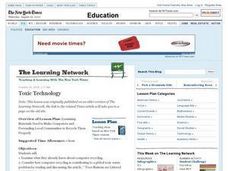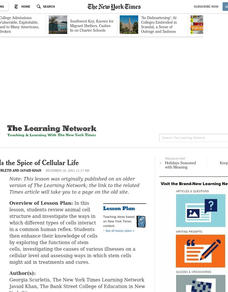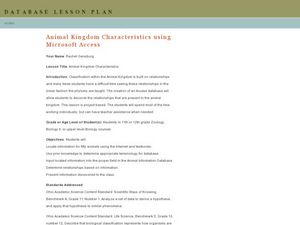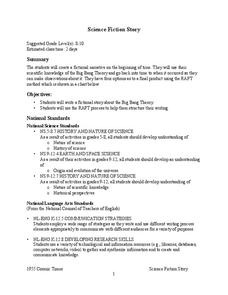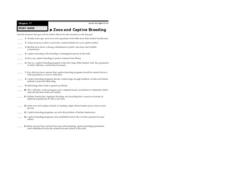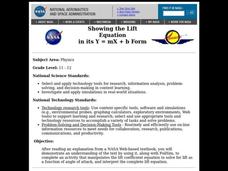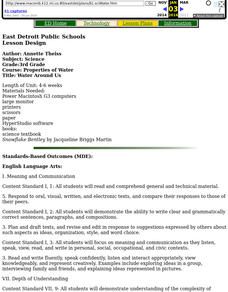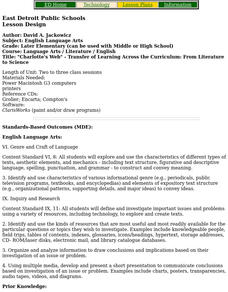Curated OER
Animal Habitats: 1st Grade
Learning about animal habitats can be a lot of fun. This lesson focuses on how God created different habitats to suit different animal needs. Students will conduct library research in order to create a five page habitat slide show using...
Curated OER
TOXIC TECHNOLOGY
Students examine what they already know about computer recycling and cconsider how computer recycling is contributing to a global toxic waste problem by reading and discussing the article, ""Poor Nations are Littered With Old PC's,...
Curated OER
Crime Scene: The Case of the Missing Computer Chip
Students, in teams, attempt to solve a simulated crime scene.
Curated OER
Variety Is the Spice of Cellular Life
Do you need to review animal cell structure? Investigate the ways in which different types of cells interact in a common human reflex. Your learners can explore the functions of stem cells, consider various illnesses and assess stem...
Columbus City Schools
The Mystery of Earth’s History
Every living creature can leave a fossil record, yet most fossils belong to extinct organisms rather than ones currently living. Scholars learn about dating rock layers, fossils, and the environment of the past. Pupils understand that...
Curated OER
Comparing Mitosis with Meiosis
Life science learners view an online animated mini textbook comparing two types of cell division. Working in groups, they use a digital microscope to capture images of cells in different stages of mitosis and meiosis. Then they create an...
Alabama Learning Exchange
Experiencing Newton's Laws of Motion
Fifth graders study Newton's three laws of motion in a whole group setting using their textbook as a resource. They work in small groups to create a multimedia presentation of one of the laws to present to the class. They design an...
Curated OER
The Human Heart: An Introduction
Fifth graders view a transparency of the human heart and answer questions based on their observations. They read pages from their textbook and discuss the information presented. They visit a website to view the human heart and create a...
Curated OER
The Earth in Space
Students use computer images to explain why the Earth has seasons and examine the phases of the moon. They create 3-D images and present them to the class. They answer a series of questions at the end of the lesson.
Curated OER
Animal Kingdom Characteristics using Microsoft Access
Students create a computer database to discover relationships present in the Animal Kingdom. In this classification lesson, students enter data into a Microsoft Access database. They answer questions on a worksheet and create a visual...
NASA
Science Fiction Story
A lesson allows you to go back in time and see the big bang actually happen. Bazinga! In reality, pupils research the Big Bang Theory and theorize what it would be like to go back in time and see it happen. There are four...
Curated OER
Zoos and Captive Breeding
After reading pages 470-472 of an unspecified textbook, students compare statements about zoos and captive breeding to information presented in text for statements of truth. Students change statements that are false so that the...
Curated OER
Sorting with Venn Diagrams
Students classify items and numbers on Venn Diagrams using computer applets. They find the similarities and differences in everyday objects.
Curated OER
Clay Sculpture: Relationships
Students explore art history by conducting an in-class activity. In this sculpting lesson plan, students examine previously created art sculptures in a textbook. Students utilize clay, sculpting tools and grey paper to create their own...
A to Z Teacher Stuff
Polar Bear Crossword
Show what you know about polar bears with a 10-question crossword puzzle. Questions pertain to a polar bears' habitat, food source, and more!
Curated OER
Plate Tectonics - Electronic Scavenger Hunt
Students explore the attributes of plate tectonics. In this plate tectonics lesson, students use computers to access a plate tectonics scavenger hunt file and complete the required activities using their textbooks.
Curated OER
Wing Area Effects Problem Set
Learners read an explanation from a NASA Web-based textbook on lift and an explanation on the FoilSim software package given below. They use FoilSim to evaluate the relationship between wing area and lift.
Curated OER
Velocity Effects Problem Set
Students, after reading an explanation on lift from a NASA Web-based textbook and an explanation on the FoilSim software package given below, use FoilSim to evaluate the relationship between velocity and lift.
Curated OER
Virus Alert
Ninth graders explore the various types and replication patterns of viruses. Using an interactive web-based textbook, 9th graders research viruses and their replication patterns. When their research is complete, students use a drawing...
Curated OER
Showing the Lift Equation
Young scholars read an explanation from a NASA Web-based textbook, then demonstrate an understanding of the text by using it, along with FoilSim, to complete an activity that manipulates the lift coefficient equation.
Curated OER
Lift Equation Problem Set
Students, after reading an explanation from a NASA Web-based textbook, demonstrate an understanding of the text by using it, along with FoilSim, to complete an activity to graph and interpret the lift equation.
Curated OER
Water Around Us
Third graders learn the effects of temperature on the states of water. Then students create paper snowflakes. Finally students complete a computer project with software which teaches the different states of water.
Curated OER
"Charlotte's Web" - Transfer of Learning Across the Curriculum: From Literature to Science
Learners research and write about the parts of a spider's body using educational software. They draw spiders using computer software.
Curated OER
Compare and Contrast Planets Using a Venn Diagram
Students use the Venn diagram template to complete the assignment or prepare their own Venn diagram using the Draw program on their computer (if available). They share their Venn diagrams with the class.

